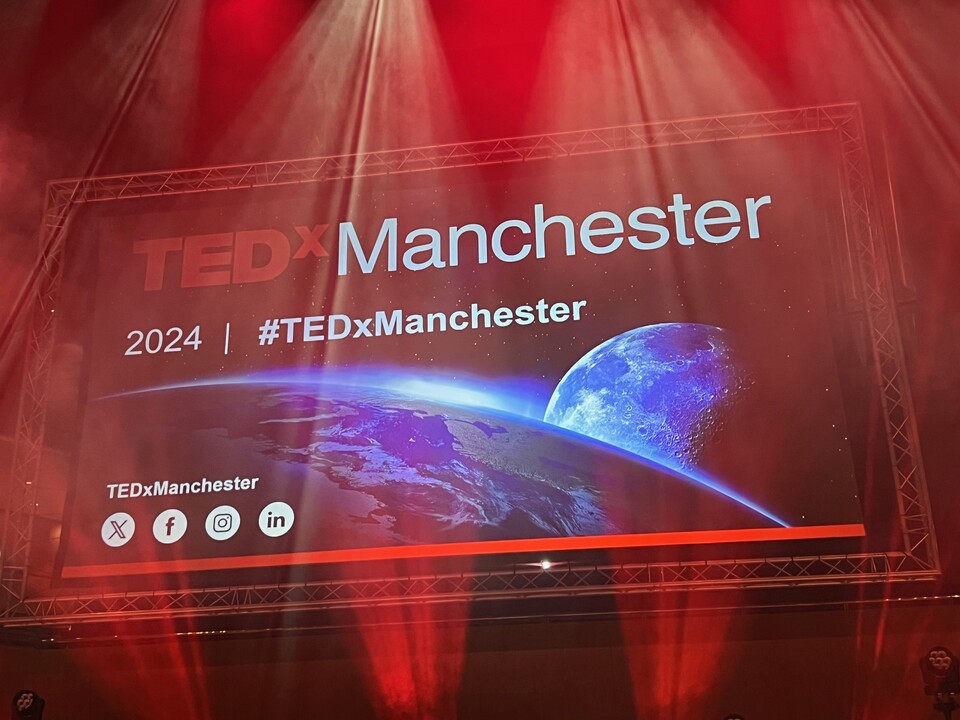This Sunday 3rd March I attended the fantastic annual TEDxManchester at the Manchester Bridgewater Hall.
For those unfamiliar with TED talks, their purpose is to share and spread ideas, to encourage discussion and new ways of thinking with guest speakers each covering a topic of their choice for 18 minutes. The variety of talks usually vary widely.
If you enjoyed this year's talks, you can also read my notes from TEDxManchester 2023.
Note: As I couldn’t determine the actual “title” of some of the talks, I've had to devise one which I think best describes the talk. Apologies to the speakers if the title I've used, or summary doesn’t capture the essence of your talk as you intended.
Herb Kim Introduction
Organiser and host Herb Kim tells us that this was the 10th TEDxManchester, the first being in 2009 and believes the attendees in the audience exhibit a curiosity and willingness to learn and challenge their preconceptions, mentioning Carol Dwecks book Mindset which promotes a growth Mindset over a fixed mindset.
Incidentally, this book is currently no 12 on my all time favourite book list and I have even written a short book review about it.
This year I spotted a bit of a second chance chance/new start/overcoming adversity theme running through the majority of the talks.. See if you can spot it.
On to the talks..
Balancing Risks in the ICU (Jim Down)
Dr Jim Down is a consultant in the Intensive Care Unit at UCL Hospitals and describes his relationship with risk in his career. Admittedly not an especially brave or courageous person, he has had to put himself at risk on multiple occasions during the duties of his job including treating victims of Ebola and deadly disasters.
Between being exposed to infectious diseases, polonium radiation and dealing with death on a scale that most people never see, he started to develop crippling anxiety and an aversion to risk, trying to avoid uncertainty altogether.
Jim was concerned that he may start being too defensive in his medical practice (defensive medicine), inadvertently putting his best interests above the best interests of his patients.
After receiving a great deal of support from the NHS and his colleagues, as well as professional help and being prescribed anti-depressants, he has now regained his perspective of balancing risk in his day-to-day.
He reflected that he was so concerned with the physical threats from infections exposure, he was unaware of the psychological threats and reminded us that doctors are famously bad at managing their own mental health.
I’m personally very impressed with Jim’s attitude. His desire to talk about his experiences, has I'm sure helped countless others in the medical profession, and helped remove the stigma around mental health (which more people struggle with than we realise) and the importance of looking after it.
Making Happy Workers (James Timpson)
While introducing James, Herb mentions the fantastic book Good to Great by Jim Collins and it shows that the most successful companies don’t solely focus on their revenue, they focus on their people. It is actually number 3 on my all-time favourite book list, feel free to read my short review of Good to Great.
James tells us that while in his late 20’s while preparing to take over the family business, he tasked himself with learning about successful businesses and admitted to wanting to do things differently to the status quo even back then, managing to get time with various business leaders to learn what made them successful.
The main thing he found was that successful businesses placed high importance in trusting their people. It was from that that he started to learn and develop his version of upside-down management, introducing a level of autonomy in his workforce that is unmatched.
Timpson's has only two rules.. put money in the till, and look the part.
He found that more trust means more innovation and happiness which means more successful businesses.
The only thing that Timpson's seems to prioritise more than autonomy is happiness. They even have a director of happiness. Timpson's seem to constantly be adding additional fringe benefits such as extra days off after marriage, pet bereavement days, paying for new teeth and sharing company holiday homes – largely because they asked and people said this is what makes them happy.
In his latest book The Happy Index (I really need to add this to GoodBusinessBooks.com), James discusses the importance of happiness in building a successful business and his unique style of upside down management. All profits from his book go to the Prison Trust.
Instilling kindness and empathy and as a result, developing stronger relationships and gaining a deeper understanding of people's motivations is a great undertaking for businesses.
He admits that this only works if you hire the right people (get the right people on the bus – to paraphrase Jim Collins, Good to Great) being unconcerned with people's CV’s and placing more emphasis on personality and potential.
Timpson's regularly recruit from prisons, supporting training programs and have to date recruited 600 ex prisoners with great qualities.
"You can find great people in unusual places”
On culture, he says it takes somewhere between 3-5 years to change a culture, and above all your culture should be focussing on avoiding and removing complexity. Timpson's has a “cut the crap committee” - which meet regularly with the intention of removing bureaucracy and complexity to streamline and improve operations.
“Organisations like to complicate themselves”
On reducing complexity.. He mentioned Parkinson and his observation that after the 2nd world war the UK navy had more admirals than ships.
When speaking with Herb he shares his concerns that many organisations seem to focus more on maintaining and increasing control than encouraging creativity and innovation and that by creating a culture and whole business around trust, while you allow the odd thing to go wrong, the organisation is by and large hugely better off and with a much happier workforce.
What Steven Hawking Gave Us (Marika Taylor)
Marika starts by explaining that while Einstein’s theory of general relativity explains why spacetime is warped by energy and mass, manifesting itself as gravity.., he believed that the universe and its containing galaxies where fairly static and had always been.
In the 1920’s Hubble discovered that galaxies were moving apart and in 1964 Penzias and Wilson discovered cosmic microwave background radiation.
Yet there were still a divide in the scientific community between those that believed the universe & galaxies were fairly static, and those that believed they weren’t.
This all changed in the 1960’s when Stephen Hawking and Roger Penrose proved that there was a big bang – that if you go backwards in time the galaxies were all created from a central point and have been expanding outwards ever since.
In 1974 Stephen discovered and subsequently named Hawking radiation emanating from black holes and explained that quantum physics allows some particles to escape black holes.
What was news to me was when Marika explained that matter destroyed by black holes actually ends up being encoded as quantum bits, making black holes the most efficient quantum computer storage device we know.
Marika ended sharing Dr Stephen Hawking's quote about being curious.
"Look up at the stars and not down at your feet. Try to make sense of what you see, and wonder about what makes the universe exist. Be curious."
And then a more somber reminded us about the ultimate fate of the universe being a long cold darkness at the end of time (but don’t worry – we'll all be dead by then as our star fails and engulfs us in millions of years time). Very true.
What Data Tells Us About the Nature of Human Identity (Blaise Aguera y Arcas)
As a side project, Blaise has collected 30,000 surveys around gender identity and shared his interesting findings.
He debunked some alleged AI research that claimed that homosexuality can be identified from a headshot. Interestingly it turns out that gay men tend to take selfies from above (as it makes them look better) whereas straight men tend to take selfies from a lower position to exaggerate their jawline.
His research shows how gender identity seems to change amongst age groups and as people get older, with a recent sharp rise in gender differences in younger people.
His findings can be seen on WhoAreWeNow.net and his full colour book X which I had a glance at looks amazing.
Shame.. An Unexpected Ally (Dr Abbie Marono)
With a background in behavioural science, Dr Abbie explains that shame can be a useful tool and isn’t as a negative emotion as we think it is.
Sharing that most people have shame and reflecting on the shame she has previously felt from various life choices, believes it is an indicator. A signal.
An indicator that we dislike something and prompt/opportunity to do something about it. Something that can be debilitating for some and motivating for others.
“Our emotions weren’t designed to be ignored”
As a species we have evolved to live in communities and societies with moral codes. Sometimes shame is a reminder that we have done something to wrong our fellow community or selves. It is an important social tool.
In a discussion about addiction with Herb, she rightly shares that “addiction isn’t the problem, it’s a symptom” and by treating the symptom, without addressing the underlying reasons/problems, then addiction may return”. The why the root cause of addiction must be understood and addressed first.
Fake History (Otto English)
Otto starts by sharing some well known, famous Winston Churchill quotes and anecdotes (or so we thought).
He quickly shares that Churchill never said or did any of the aforementioned things and that they are embellishments or outright fallacies.
And in fact, he says that the generally accepted events of Dunkirk are untrue – and that the British public did not come out in full force and personally sail a flotilla of boats across the English channel.
He asks whether we should be repeating these myths that once upon a time served a purpose but have now become a Hollywood tool.
He understands why historic events and quotes are used and to what effect. Otto’s main concerns don’t seem to be the inaccuracy of the information but its use in modern contexts, especially when used for political purposes.
It reminds me of the quote – “In war, the first casualty is truth”
Coping with Grief, Life as a Widow (Nicky Wake)
Nicky shared her personal story and journey with grief after having lost her husband. She shared how difficult it was, how she got through it and how she went on to create something positive in the world o help make sense of her loss and confirms that time does heal.
She went on to create a successful dating app for widows and widowers, helping others in similar situations.
“There is hope after grief”
Youngr
A Musician who composed and played some dance music, It was rather good. He created lots of loops in real-time with a variety of sophisticated (and not so sophisticated) tools.
A White Collar Boxer (Selma Masood)
Originally from Hong Kong and living in Manchester, International Lawyer Selma who originally discovered white collar boxing in Hong Kong, returned to the ring in Manchester.
With a strong focus on training and boxing ironically being her “safe space” she shared the experience of preparing for a fight and the thoughts and feelings she feels while fighting, often giving a blow-by-blow account of her fights.
She invited her coach on stage and gave a demo of her training.
Different Types of Conversations (Charles Duhigg)
Charles Duhigg (yes - THE Charles Duhigg) discussed how conversations can be difficult when people are having different types of conversations with each other, mentioning that there are three types of conversation: practical, emotional and social and it is only when we are having the same type of conversation (the matching principle) can progress be made. As mentioned in his new book Supercommunicators.
“We have forgotten how to have conversations”
He encouraged asking “deep questions” to determine the type of conversation someone wants to have, asking about their feelings and state of mind rather than just discussing facts. Only by feeling vulnerable can we encourage reciprocal vulnerability and form a stronger connection on which to have better conversations. Empathy.
Sleep Posture Implications (James Leinhardt)
James discussed how important sleep positions are if we want to live a healthy, well rested pain free lifestyle. He remarked that we are constantly being told the importance of sleep but are seldom told how best to do it. He shared diagrams of good and bad sleep positions and discussed his work with patients with mobility issues and athletes.
“Posture is the eternal fight with gravity”
He discussed the Mood -> Sleep -> Pain cycle and said it could be reversed, remarking that he has had success increasing mood and reducing pain through simple sleep training.
I found James particularly funny as he dropped a few quips into his talk. I don't think he realises just how entertaining his style of public speaking is is to listen.
The Power of Communal Singing (James Sills)
James discussed how singing has served as a social tool for bringing people together and communicating for thousands of years.
He discusses the many benefits of singing including the release of oxytocin in the brain and is clearly very passionate about getting people into singing.
He had the entire audience on their feet participating in a type of impromptu acapella singing performance.
Summary
Hopefully, you could also see a similar thread of second chances and re-invention running through the talks.
As usual, I want to thank all the speakers, organisers and volunteers for putting on a great event. I can’t wait until next years.
I spoke with some really interesting people yesterday, so if I spoke to you or you were at TEDxManchester, please feel free to reach out and connect with me on LinkedIn.
Each time I attend a TEDxManchester event, I feel one step closer to one day giving my own TED talk. As a Microsoft MVP, I do a bit of public speaking myself, but nowhere on the scale of Bridgewater Hall. The prospect of delivering an 18 minute talk on the Power of Play and Experimentation in Innovation (likely my topic of choice) to an audience that size fills me with both excitement and dread. I aim to see if I can talk at one of the much smaller TEDx events before that.
Your next Head of Innovation?
Today was actually my last day at Avanade, so if you are looking for a Director/Head of Innovation or Technology Strategy, someone that can instill a culture of innovation, devise business technology/innovation strategy to leverage the latest technologies including VR, AR, MR & AI to improve the business or create innovative value propositions for clients, please get in touch.
Until next time!
-- Lee
















